|
|
|
Sort Order |
|
|
|
Items / Page
|
|
|
|
|
|
|
| Srl | Item |
| 1 |
ID:
106361
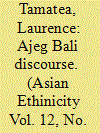

|
|
|
|
|
| Publication |
2011.
|
| Summary/Abstract |
This article explores the Ajeg Bali movement in Bali, Indonesia, as manifest online. It is argued that in addition to Ajeg Bali comprising local politics of decentralisation, it is a manifestation of the globally mobile culture of fear. Analysis of online Ajeg Bali discourse shows the deployment of discourses of fear as a response to intensified hybridising incursions into the Balinese nation-space, resulting from the increased mobility of ideas, images, capital, people and technology.
|
|
|
|
|
|
|
|
|
|
|
|
|
|
|
|
| 2 |
ID:
157791
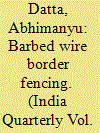

|
|
|
|
|
| Summary/Abstract |
The Government of India decided to fence the entire India–Bangladesh border to prevent the illegal immigration from Bangladesh and to prevent the cross-border illegal and antisocial activities. Since the year 1986, the Government of India started the initiative to construct the border fencing in phase manner. The single wire border fencing which was created in the first phase has been replaced by the composite type of barbed wire border fencing a few years ago. Now the border fencing along the international border between India and Bangladesh has become a structural barrier for the Indian families living at the Country’s territorial edge. The families trapped in the geographical space between actual line of partition and the border fencing are living a restricted and deprived life within the limited land.
This study is basically focused on the impact of the border fencing on the citizenship rights of the Indian fenced out families. This article will discuss how the defensive policies of the Government are affecting the citizen’s rights at the border regions of the country and subsequently resulting in displacement.
|
|
|
|
|
|
|
|
|
|
|
|
|
|
|
|
| 3 |
ID:
082447
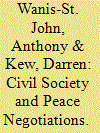

|
|
|
|
|
| Publication |
2008.
|
| Summary/Abstract |
The fact that civil society groups play important roles in post-conflict peacebuilding has entered the mainstream of international conflict resolution dogma. Rarely do local civil society groups get a seat at the negotiation table for peace accords. Although the exclusion of civil society from peace negotiations may streamline the process, the absence of civil society voices and interests at the negotiating table can negatively impact the sustainability of a peace agreement during peacebuilding. Surveying a wide variety of different peace processes, a strong correlation was found between active civil society participation in peace negotiations and the durability of peace during the peacebuilding phase. Cases in which civil society groups actively engaged in peace negotiations seemed to enjoy more sustained peace in the peacebuilding phase. This holds true also for cases in which civil society groups did not have a direct seat at the table, but did exercise significant influence with the negotiators because they were democratic actors. War resumed in many cases not characterized by direct or indirect civil society involvement in the peace negotiations. No claim of causality is made; the sustainability of peace surely rests on causes as complex and dynamic as the initiation of war does. However, these findings do call attention to the need for further research to understand the special impact that civil society inclusion at the peace table may have
|
|
|
|
|
|
|
|
|
|
|
|
|
|
|
|
| 4 |
ID:
171213
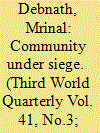

|
|
|
|
|
| Summary/Abstract |
This article presents and analyses the voices and responses of the research participants about the impact of exclusionary formal and informal education policies imposed on the Santal community in Palashpur, Bangladesh (Palashpur is a pseudonym for the site of my research; it is also a metaphor for contested space where the colonial power and politics of the nation state exert domination and subordination). These policies are implemented through a state-led, centralised, monolingual and exclusionary curriculum in local primary and secondary schools, schools run by the churches, and schools supported by nongovernmental organisations. The education policies in Bangladesh bear the legacy of the combined forces of cultural homogenisation and social exclusion rooted in the colonial learning structure and its objectives. Embedded in these policies are elements of the civilising mission, an ultra-religious assimilative but exclusionary nationalistic agenda, and Western values of modernity and development. In this rural context, these alien ideologies and practices in education are actively engaged in eliminating local institutions, the knowledge system of indigenous peoples, the texture of their lives, their joy of living, their spirituality and their sense of being. This article reveals how, imposed from above, education policy and practices have dispersed an indigenous community to negotiate a life that goes against the interests of the community itself and its members.
|
|
|
|
|
|
|
|
|
|
|
|
|
|
|
|
| 5 |
ID:
185589


|
|
|
|
|
| Summary/Abstract |
This article argues that in Pakistan, intra-Islamic differences and the contested field of Islamic identity politics affected and moulded the country’s integrated and overlapping religious identities into distinct and disparate categories at the micro level. The article discusses the process of formation of the jamaat of the Sufi-inspired silsila, the Naqshbandia Awaisia, by Major Ghulam Muhammad among the military and an urban middle-class constituency. It shows how the jamaat conceptualised and imbued Sufism with an exclusivist approach, positioning Sufism and Sharia within an Islamic discourse that categorically rejected the religion’s ritual and devotional aspects. This embroiled these mutually constitutive and intersecting dimensions, Sharia, esoteric Sufi doctrine and the devotional and ritual aspects in an ambivalent relationship. The exclusion of the devotional and ritual aspects became a boundary-setting label of difference between the ‘proper’ Muslim and the ‘other’ along a matrix of knowledge and power.
|
|
|
|
|
|
|
|
|
|
|
|
|
|
|
|
| 6 |
ID:
180360
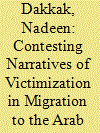

|
|
|
|
|
| Summary/Abstract |
The experiences of migrant workers in the Arab Gulf States tend to be understood through narratives of victimization. This article aims to problematize such narratives through an analysis of three short stories set in the Gulf by Filipina-American writer Mia Alvar from her debut collection In the Country (2015). Mapping out ways in which these stories depart from narratives that revolve around themes of exploitation and exclusion, the article demonstrates that fiction can critically engage with the tension between the need to represent and make visible the reality of migrant experiences in the Gulf, and the need to question the essentialism and inflexibility through which they tend to be framed. Using the insights of recent anthropological and ethnographic research on the Gulf’s non-citizen population, I argue that Alvar’s stories both expose the structural inequality that facilitates victimization and pave the way for a more nuanced understanding of migrant experiences in the Gulf.
|
|
|
|
|
|
|
|
|
|
|
|
|
|
|
|
| 7 |
ID:
151740
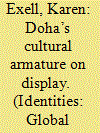

|
|
|
|
|
| Summary/Abstract |
After a brief discussion of the rapidly changing international museum world in Doha, this response piece engages with Peggy Levitt’s arguments around cultural armature and the role of museums in managing a city’s diversity, focusing on Doha, Qatar. Given the dominant migrant foreign population (88 per cent) and the careful protection of national citizenship in Qatar, the role of museums in managing diversity presents a situation that contrasts with older nation states: rather than encouraging inclusion, the museums in Qatar and the Arabian Peninsula states play a role in constructing and protecting a pure concept of national identity on behalf of a minority citizen population that deliberately fails to embrace any notion of diversity. This piece uses brief case studies to illustrate this process of exclusion, expanding Levitt’s original argument.
|
|
|
|
|
|
|
|
|
|
|
|
|
|
|
|
| 8 |
ID:
164160
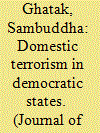

|
|
|
|
|
| Summary/Abstract |
Scholars continue to disagree on the relationship between regime type and political violence, perhaps because the empirical evidence remains contradictory. To date, most studies generally explore the direct relationship between democracy and terrorism. Yet, we think the effect of regime type on terrorism is conditional on the presence of politically excluded groups whose grievances motivate them to challenge the state. We need to take into account both willingness/grievance and opportunity to understand political violence. Using a global data set of domestic terrorism between 1990 and 2012, we find that different regime-associated features of democracy relate differently to domestic terrorism. Higher levels of the rule of law tend to decrease terrorism, whereas electoral democracies tend to experience more domestic terrorism. However, domestic terrorism increases in every form of democracy in the presence of political exclusion. As such, an effective counterterrorism policy must address underlying grievances as democratization by itself may actually drive domestic terrorism up.
|
|
|
|
|
|
|
|
|
|
|
|
|
|
|
|
| 9 |
ID:
166671
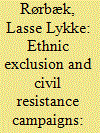

|
|
|
|
|
| Summary/Abstract |
Previous research has argued that political inequality between ethnic groups increases the likelihood of both nonviolent and violent protest. In this study, I focus on civil resistance campaigns and argue that the probability that these large-scale, organized movements will take violent over nonviolent forms increases with the share of a country’s population that is excluded from political power on the basis of ethnic affiliation. I expect this to be so because ethnically exclusive regimes are more likely to counter political demands with violent repression, which increases the cost and decreases the anticipated success of nonviolent relative to violent resistance. I test this proposition in a global sample of countries for the period 1950–2006 and find, first, that high levels of ethnic exclusion make civil resistance campaigns more likely to occur violently than nonviolently. Next, to assess the mechanism at play, I conduct a mediation analysis and show that almost half of the effect of ethnic exclusion on violent campaign onset is mediated by the latent level of violent repression in a country. This result suggests that political authorities’ repressive strategies are key to explaining why regime opponents do not always opt for nonviolent forms of civil resistance.
|
|
|
|
|
|
|
|
|
|
|
|
|
|
|
|
| 10 |
ID:
148665
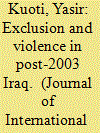

|
|
|
|
|
| Summary/Abstract |
This paper examines the origins of political violence in Iraq. It argues that, in the wake of the democratic transition process in from 2004 to 2005, Iraqi exiles, who were chiefly Shiite Muslims and Kurds appointed by Paul Bremer, Iraq’s U.S. civilian administrator, moved to write a constitution and set up a political system that deliberately marginalized minorities. Since then, the Sunni minority began and continues to engage in or support violence against the state. It suggests that violence and instability in Iraq are to be understood in terms of local contexts of meaning, notably the nature of struggle for political power.
|
|
|
|
|
|
|
|
|
|
|
|
|
|
|
|
| 11 |
ID:
156655
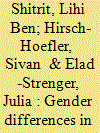

|
|
|
|
|
| Summary/Abstract |
The relationship between gender and political aggression is hotly debated and the empirical evidence is often mixed. While many surveys find a gender gap, with women less supportive of politically motivated aggression and violence than men, numerous case studies point to women’s active involvement in political violence and refute the association of women with peacefulness. This article argues that the gender–aggression relation depends upon (1) the type of political aggression under study (i.e. direct vs. indirect political aggression), and (2) contextual factors, notably the salience of a protracted conflict. Using original datasets representing Israeli Jews (N = 3,126) we found that in the context of protracted conflict, gender has a unique effect on support for indirect forms of political aggression, over and above other central predictors of political aggression (i.e. political orientation and threat perceptions), such that women are actually more supportive of politically motivated social distancing and exclusion of out-groups in conflict as compared to men. Women and men, however, do not differ in their support for direct, politically motivated, violent acts against government officials. Results also shed light on potential mechanisms underlying these differences (and lack thereof), in the context of protracted conflict. The findings cast further doubt on the stereotype of ‘peaceful women’ and point to the need for policymakers concerned with conflict resolution to address context-related factors when considering the gender-based differences in political aggression.
|
|
|
|
|
|
|
|
|
|
|
|
|
|
|
|
| 12 |
ID:
087281
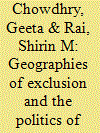

|
|
|
|
|
| Publication |
2009.
|
| Summary/Abstract |
In this essay, we argue that race has yet to be integrated as an analytical category shaping the study and teaching of international relations. We suggest that although the issues of race and gender are systematically coded into central concepts in the discipline, they are made invisible through a "series of ontological and epistemological maneuvers." Focusing on two concepts central to the discipline-sovereignty and the nation-state-we suggest that race can be better integrated into the teaching of international relations by focusing on the ways in which these maneuvers structure the geographies and politics of exclusion and inclusion in international relations. We conclude that raising questions about the ways in which race is taught in the academy is in itself critical-what we teach, how we teach, and who teaches are all questions that need repeated airing for achieving interpretative autonomy as well as a transformative politics.
|
|
|
|
|
|
|
|
|
|
|
|
|
|
|
|
| 13 |
ID:
075768
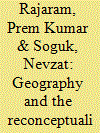

|
|
|
| 14 |
ID:
165663
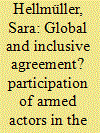

|
|
|
|
|
| Summary/Abstract |
This article provides an analytical framework to understand how participation of armed actors in peace negotiations influences local violence. It argues that the link between violence and exclusion or inclusion of armed actors is often indirect and depends on armed actors’ underlying motivations to be included and their corresponding strategies. Based on an analysis of the Congolese peace process from 1999 to 2003, the article assesses how the mandate of the peace process influenced armed groups’ motivations to be included. It then analyzes the strategies that armed actors used to be included and examines their impact on local violence. Thereby, it allows for a more nuanced understanding of how participation of armed actors in a mediation process influences prospects for peace.
|
|
|
|
|
|
|
|
|
|
|
|
|
|
|
|
| 15 |
ID:
119502
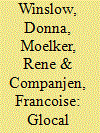

|
|
|
|
|
| Publication |
2013.
|
| Summary/Abstract |
In Chechnya a protracted conflict only seemingly quieted down, but it still smolders and as the conflict is suppressed by coercion, it is inevitable that it will flare up at some time in the near future. The root causes of the conflict can be understood by use of globalization theory, which dialectically brings together the clashing forces from above and below. Civil society in Chechnya deteriorated, is politically curtailed, and has no resilience left. It thus results in a frozen conflict and an excluded and victimized society. Russian-style reconstruction does alleviate living conditions, but does not remediate the frozen conflict character of the present situation. The dynamics of the globalizing forces from below and above, summarized in the glocalization concept, not only explains the resistance by the Chechen people, for whom revolt, rebellion, and terrorism remain attractive options, but also serves as a model for other insurgencies. Reflecting on the two recent Chechen-Russian wars results in a paradigmatic case study.
|
|
|
|
|
|
|
|
|
|
|
|
|
|
|
|
| 16 |
ID:
185186
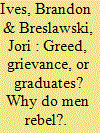

|
|
|
|
|
| Summary/Abstract |
Education is widely known for its positive effect on conventional politics and nonviolent protest as well as its suppressive effect on violence. However, recent studies have connected education to violence through its effect on relative deprivation and frustration–aggression mechanisms. We address these divergent findings by presenting a theory of the conditional effect that education has on violence. To do so, we build on literature addressing education’s positive association with political participation, such as voting and protests, and question how this relationship translates to contexts in which conventional and nonviolent channels are unlikely to be effective – specifically, in cases of politically excluded ethnic groups. We argue that education increases ethnic group members’ resources and desire to address grievances. Yet, because the ethnic group is politically excluded, opportunities for conventional politics and nonviolent protest are limited. Educated ethnic group members are limited in political options, and are thus more likely to address their grievances through the support of rebel groups, increasing the probability of violence. Violence then occurs in localities where members of a politically excluded ethnic group are located and where those members have higher levels of education. Using geo-spatial data and statistical analysis, we demonstrate that education has divergent effects on violence in areas populated by politically excluded versus politically included ethnic groups in Africa and Central America. Areas with highly educated politically excluded ethnic group members are the most likely to experience violent events.
|
|
|
|
|
|
|
|
|
|
|
|
|
|
|
|
| 17 |
ID:
171799
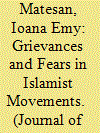

|
|
|
|
|
| Summary/Abstract |
This article examines how exclusionary policies and repressive measures affect the propensity of Islamist groups in nondemocratic settings to engage in violence. The central argument is that exclusion from electoral politics, from civil society, and from public discourse can increase political grievances, whereas symbolic threats to religious values spark sociocultural grievances; state violence and repression foster a sense of insecurity. The article proposes that Islamist groups are both principled and strategic actors, who may adopt violent rhetoric in response to political or sociocultural grievances, but who resort to violent tactics primarily out of a sense of insecurity. The quantitative examination of twenty-two Islamist groups from the Middle East confirms that exclusionary policies can spark violent rhetoric, whereas repression and threats to the physical integrity of a group increase the propensity toward violent behavior. However, when insecurity turns into disillusionment, groups can also move away from violence if they feel alienated from the public. The close investigation of the Muslim Brotherhood and al-Gama'a al-Islamiyya in Egypt shows that the response to repression depends on the length of the conflict, the level of fragmentation within an organization, and public opinion.
|
|
|
|
|
|
|
|
|
|
|
|
|
|
|
|
| 18 |
ID:
185092
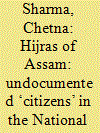

|
|
|
|
|
| Summary/Abstract |
This paper presents the case of hijras of Assam who are undocumented in the National Register of Citizens because of their fractured identity and adopted gender and face the risk of being declared illegal immigrants despite being citizens. The paper focuses on how transgender individuals are excluded from different aspects of citizenship as a consequence of document-focused procedures created and enforced by the state. The primary argument is that document-focused procedures of the modern state, rooted in heteronormative underpinnings, are exclusionary for transgender individuals.
|
|
|
|
|
|
|
|
|
|
|
|
|
|
|
|
| 19 |
ID:
176577
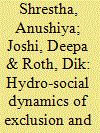

|
|
|
|
|
| Summary/Abstract |
Processes of urbanisation create peri-urban spaces that are socially and institutionally fluid. In this article, we analyse how contestations and competition over declining water resources in peri-urban Kathmandu Valley in Nepal reshape water use, access and rights as well as user communities themselves, by creating and reproducing new and existing exclusions and solidarities. Traditional caste-based discriminatory practices, prohibiting Dalits from physically accessing water from sources used by higher castes, are said to be no longer practiced in Nepal. However, our findings show that, exclusion persists for Dalits even though the characteristics of exclusion have changed. In situations of competing water claims in the research location, Dalit households, unlike higher-caste groups, are unable to exercise prior-use water rights. Their water insecurity is compounded by their relative inability to mobilise political, social and economic resources to claim and access new water services and institutions. By juxtaposing the hydro-social and social exclusion analytical frameworks, we demonstrate how exclusions as well as interpretations and experiences of water (in)security are reified in post-Maoist, supposedly inclusive Nepal.
|
|
|
|
|
|
|
|
|
|
|
|
|
|
|
|
| 20 |
ID:
117138
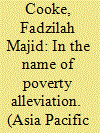

|
|
|
|
|
| Publication |
2012.
|
| Summary/Abstract |
Oil palm in Sabah is grown in large plantations or smallholdings, the latter mostly managed by indigenous peoples on untitled customary land. Government development agencies have long focussed on improving the productivity of smallholders for poverty alleviation. For most smallholders, the main issue is tenure insecurity: as long as lands remain untitled they are subject to changes in land allocation and land use at the discretion of the State Government. Indigenous claimants seek recognition of the right to use and occupy ancestral lands via individual Native Titles (NT), as provided for in the Sabah Land Ordinance (SLO). Recent official push for converting such 'idle' customary lands by promoting large scale joint ventures between customary landowners and oil palm companies is creating anxiety among many indigenous groups. The joint-venture approach has been enabled through a crucial amendment to the SLO that promotes the granting of communal titles (CT) with conditions attached. This tenure instrument empowers state-appointed trustees to make key decisions concerning land use where commercial crops (especially oil palm) are favoured and on the eligibility of descendants (pewaris) to participate in the joint venture or not. The complexity of local concerns and official responses is captured via a case study at Lalampas in the Tongod District of Sabah.
|
|
|
|
|
|
|
|
|
|
|
|
|
|
|
|
|
|
|
|
|